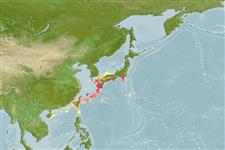>
Mulliformes (Goatfishes) >
Mullidae (Goatfishes)
Etymology: Upeneus: Greek, ypene, -es = upper lip (Ref. 45335); itoui: Named for Mr. Masahide Itou who collected almost all Kagoshima specimens of the new species and kindly made them available to the authors. Sakuya-himeji and Oriental Goatfish are herein proposed as the standard Japanese and English names, respectively, for the species (Ref. 88711).
Environment: milieu / climate zone / depth range / distribution range
Οικολογία
Θαλασσινό(ά) βενθικό(ς); εύρος βάθους 23 - 27 m (Ref. 88711). Tropical
Northwest Pacific: southern Japan.
Μέγεθος / Βάρος / Age
Maturity: Lm ? range ? - ? cm
Max length : 12.3 cm SL αρσενικό/απροσδιόριστο; (Ref. 88711)
Short description
Κλείδες προσδιορισμού | Μορφολογία | Μορφομετρία
Ραχιαίες άκανθες (συνολικά) : 7; Μαλακές ραχιαίες ακτίνες (συνολικά) : 9. A species of Upeneus with the following combination of characters: dorsal-fin rays VII + 9, first dorsal-fin spine longest; pectoral-fin rays 13–15 (usually 14); gill rakers 6 or 7 (mode 6) + 16–18 (17) = 22–25 (23); pored lateral-line scales 28–30 (29); no teeth on ectopterygoids; maximum body depth 20.9–24.7% SL (mean 22.7%); maximum head depth 18.0–20.6% SL (19.2%); barbel width 6.0–7.8% HL (7.0%); barbels white; a distinct reddish brown stripe from tip of snout to caudal-fin base through eye in life and fresh specimens; first dorsal fin with 4 irregular white bands in life, 4–6 irregular reddish brown bands (retained as dark bands in preserved specimens) and 4–6 white bands in fresh specimens; upper caudal-fin lobe pale white with 5–7 reddish brown bands (retained as dark bands in preserved specimens) and 5–9 irregular pure white bands in life and fresh specimens; lower caudal-fin lobe reddish with 5–9 short red bands (retained as dark bands in preserved specimens) and 5–9 short white bands or spots along ventral margin in life and fresh specimens (Ref. 88711).
Life cycle and mating behavior
Maturities | Αναπαραγωγή | Spawnings | Egg(s) | Fecundities | Προνύμφες
Yamashita, M., D. Golani and H. Motomura, 2011. A new species of Upeneus (Perciformes: Mullidae) from southern Japan. Zootaxa 3107:47-58. (Ref. 88711)
IUCN Red List Status (Ref. 130435)
Threat to humans
Harmless
Human uses
Εργαλεία
Special reports
Download XML
Διαδικτυακές πηγές
Estimates based on models
Phylogenetic diversity index (Ref.
82804): PD
50 = 0.5000 [Uniqueness, from 0.5 = low to 2.0 = high].
Bayesian length-weight: a=0.00955 (0.00454 - 0.02011), b=3.10 (2.93 - 3.27), in cm total length, based on LWR estimates for this Genus-body shape (Ref.
93245).
Τροφικό Επίπεδο (Ref.
69278): 3.4 ±0.4 se; based on size and trophs of closest relatives
Ελαστικότητα (Ref.
120179): Υψηλό, ελάχιστος χρόνος για διπλασιασμό πληθυσμού < 15 μήνες (Preliminary K or Fecundity.).
Fishing Vulnerability (Ref.
59153): Low vulnerability (10 of 100).
